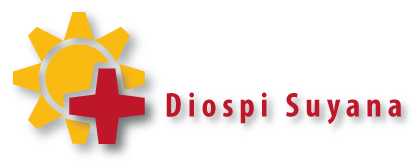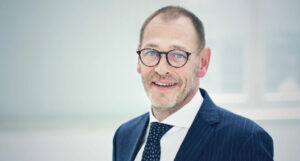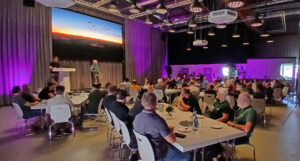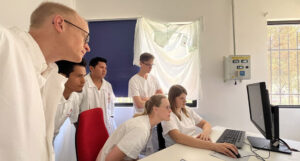
Against the background of continuing consolidation
Life returned to the Diospi-Suyana-School campus on 1st March. After a three year foundation phase the first part of the consolidation phase has started. It challenges the members of staff and the currently 260 pupils in various areas:
- The form teacher’s role is not to be underestimated. (S)He leads, motivates, gives orientation, organises, mediates, teaches, conciliates, connects and much, much more. Furthermore, if working together with the families is as challenging as it is in Curahuasi, then the manifold tasks taken together equal in their complexity a SME. We have amended the school timetable so that every class spends the first 25 minutes of every day with their Tutor or Tutora. During this time the children are welcomed personally, hear a short reflection on a Bible verse and all school topics relevant for the yearly curriculum are discussed. Then the 30 lessons a week kick off.
As mentioned above, the form teacher is the most important point of contact for the Alumni, (s)he is a constant companion throughout the years at school. Each teacher has come to Curahuasi because (s)he wants to be a living example for the pupils. As the Cuban writer José Martí (1853-1895) once said: “Instruir puede cualquier, educar sólo el que sea un evangelio vivo.” (Everyone can teach, but only those can bring up children who live a life of the Gospel). Most of the pupils have a great interest in reading the Bible and learning more about their Creator. And as mentioned during talks in the past year, this happens in the most amazingly natural ways.
- From the start of this school year each form teacher establishes a group of volunteers, who want to learn more about the footprints of Jesus in the Bible, aiming to learn what discipleship means in today’s world. As part of this project we are expanding our weekend camp work, since during these times many children decide to give their lives to Jesus Christ.
- For the first time the pupils of the Secundaria (years 7-11) can choose which sport they would like to pursue: Vóley, Básquet und Fútbol – they train in year-overlapping groups. Thereby we hope to establish and train strong school teams, which can then participate in local and regional inter-school competitions.
If you want to go to university in Peru you need to pass demanding entrance exams. The paedagogical quality of the school plays no role in the application process for the best universities. Surely not all of our pupils will go to university, but we strive to give each and every pupil the means to pass the exams. Since most parents are unable to pay for the expensive Academias (preparation classes which go on for several years), we also try to lay a good foundation by offering pre-university courses during the pupils’ school careers. A job orientation, in which also technical jobs are presented, is part of this package.
We have realised a big dream: a chemistry and a physics lab (see the pictures below). In both scientific classrooms experiments can be performed. After Dr. Klaus-Dieter John, as head of the school’s board, had spent a long time asking for donations in kind in Germany without any success, we were able to find a company in Lima, who provided us with the furnishings for a sixth of the price we would have paid for in Germany. Some of the inventory is already in the chemistry lab. Once we have received further donations we will be able to buy a portable flue and the necessary chemicals. Over the next couple of years we hope that we will be able to equip our physics lab fully, which currently has hardly any inventory.
In the meantime our three science teachers are working hard implementing what they have been trained for: how to facilitate the pupils to make their own observations and discoveries by performing experiments. Thereby one taps into new resources: one of our German volunteers showed them experiments he had done last year in his final year at school. To complement these experiments we found Chilean teaching material, which is much clearer and takes a more hands on approach. It will be a very long journey, but the team is determined to make a completely new start.
The new school canteen will open this Wednesday. It took three years to build. Companies Ascobloc and Sachsenküchen, as well as a Zwillingwerke employee, who hails from Wuppertal, made significant donations in kind. On the picture you can see Fredy Quiñones, our Argentinean cook, polishing glasses, pots and the new cutlery from Solingen.
We had already described our internal quality programme here as a web commentary on 19th February.
We are happy and thankful for all the readers and friends worldwide who support our work so faithfully both financially and prayerfully. With heartfelt greetings from the Diospi-Suyana-School. /C.B.













